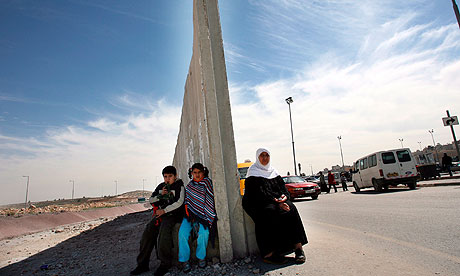
This week, we visit Jerusalem in the company of Jasmine Donahaye, whose poem "The bus to Ramallah" is from her second collection, Self-portrait as Ruth, published by Salt in 2009.
Donahaye's earlier volume, Misappropriations, was shortlisted for the Jerwood Aldeburgh first collection prize and for Wales book of the year. The daughter of a kibbutznik, with family roots in Ottoman Palestine, she grew up in England, spent formative time in Israel and the US and now lives in mid-Wales, where she edits the cultural and political journal, Planet.
Donahaye's poems are informed by this complex of cultural affiliations. Rather than define them oppositionally, she finds imaginative ways of dissolving borders and creating unities. In the poem "Palestina," for example, Israel and Palestine are represented as women lovers, their scarred bodies mirroring each other's, even as their visions of identity remain at odds. The title-poem, "Self-portrait as Ruth", brings some of the themes and images of the Book of Ruth startlingly into a contemporary rural Wales of quad-bikes and tractors. "Gaza, summer 2006" imagines mourners from all the world's corners bringing small stones in memory of the dead, and piling them into cairns that become mountains until "once again there's nothing to fight over/ but stony ground,/ as the only thing ever to fight over/ was stony ground."
"The bus to Ramallah" works differently. While the poem's thrust is idealistic, it withholds the scenario of transformation; its narrative tone is low-key, its settings firmly in the everyday world. It begins with a vignette of big-city rush and indifference: an unhelpful bus-driver, a hard, hot trek across town ("I walked,/ I walked until my heels split...") and the growing sense of unease at leaving a familiar space to become dependent on the good will of strangers.
In the second stanza, the narrator has arrived at the Damascus Gate, where the atmosphere of the Arab souq is briskly caught in a snapshot of "shishlik-sellers and plastic tableware." The poverty of the quarter emerges in the image of the bus station's "stained cement bench". A bus journey into Palestine might feel like a dangerous enterprise, and the anxiety and urgency are perhaps registered through the repetition of "ware" and "where". But now there are friendly strangers to answer the question. The second bus-driver, though silent, smiles and is helpful. The three men on the bench, presumably from Ramallah and now waiting to go home, seem almost like magi, the three wise men. The way they move and speak in unison suggests a solidarity and relaxed certainty very different from the tense isolation of the narrator. "Here, here" they cry, a reassuring echo of "ware"/ "where". The last line brings the story-so-far to its climax: the third driver not only smiles at the woman boarding his bus, but bids her welcome.
But the narrator's anxiety continues: safely on the right bus, she still remains an outsider, not only in ethnicity but in gender. "I saw, in my hurry, I'd put my shirt on inside out/ and now, among men, I could not put myself right." The idiomatic phrase "put myself right" enhances the sense of a deeper distress; it isn't merely the shirt but the self that is somehow at odds with its setting. The reference to not seeing East Jerusalem or the bleak Israeli checkpoint of Qalandia furthers the sense of dislocation. A mere tourist would stare at the "sights" but this historically implicated traveller seems to experience bodily the abyss where emblems of division are rooted.
The poem is moving because of its ungarnished directness. There is no evasion. The speaker always seems vulnerable and exposed, and the epiphany, produced by the kindness she has received, brings her near despair: "I leaned my face against the smeared glass and wept,/ because surely nothing was worth it costing this…"
The powerful longing for reconciliation floods the last four lines. The speaker's memory fixes on the driver's word, "Welcome," and this time we're given its Hebrew translation, "baruch ha'ba," followed by the beautiful, literal rendering: "a blessing that you've come." A heartfelt political poem, "The bus to Ramallah" also reaches beyond the politics of the moment to mourn a lost culture of generosity to strangers. Besides presenting a parable about Israel and Palestine, it reminds us of all unhealed divisions between rich and poor, ancient and modern, native and immigrant. It reminds us how desperately every nation, east and west, and all citizens, of whatever status, need those words – the good words in any language that mean "welcome."
The bus to Ramallah
I asked if his bus went to the Old City
but he clicked his tongue, jerked his chin
and drove on. I walked,
I walked till my heels split
and I was late, rushing to the bus station
at the Damascus Gate.
Among shishlik sellers and plastic kitchenware,
I asked a driver about to leave where
is the bus to Ramallah? He smiled, pointed,
and as I came to the stained cement bench
three men gestured to me to sit; three men called
when the bus arrived: here, here, you wanted
Ramallah, and the driver smiled and said welcome.
I saw, in my hurry, I'd put my shirt on inside out
and now, among men, I could not put myself right.
I hardly saw East Jerusalem, Qalandia –
I leaned my face against the smeared glass and wept,
because surely nothing was worth it costing this:
that we've lost what it means, welcome,
baruch ha'ba, a blessing that you've come.

